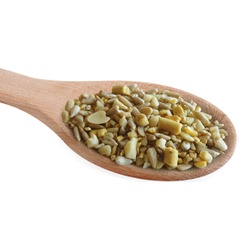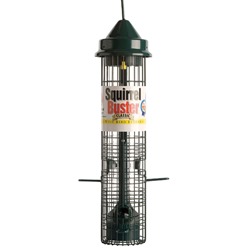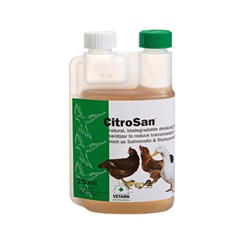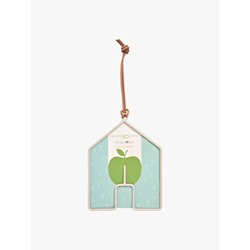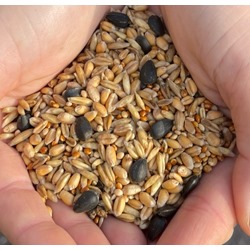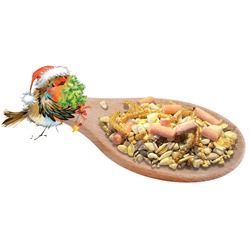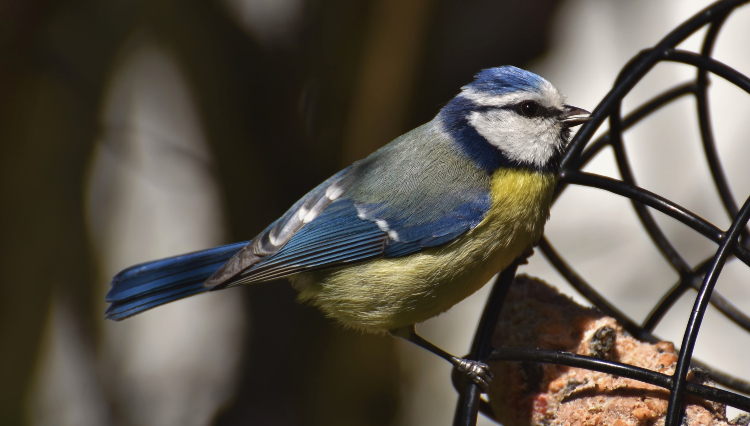
While there is a lot of emphasis on feeding wild birds in the winter, it’s actually beneficial to feed garden birds all year round! There’s a common misconception that birds don’t need to be fed in the summer months, and even that feeding birds in the summer will make them fat and lazy, but that’s not the case!
While it’s true that winter can be a particularly difficult time for wild birds with natural food (and occasionally drinkable water) being in short supply, wild birds will benefit from feeding all year round. Feeding wild birds through all seasons is an effective way to support their populations; improving chick numbers born and the survival of youngsters, and helping adults to stay in good body condition.
What to feed wild birds all year round
Wild birds can benefit from feeding all year round, but as the seasons change, so does the type of feed most beneficial to their survival. Here are Really Wild Bird Food we’ve put together this handy guide to help you select the right bird feeds for different times of year.
Feeding wild birds in spring
Spring is a busy time – for most wild birds this is their breeding season, and they will have many chicks and fledglings relying on them to bring home a meal. While breeding/nesting season for birds can vary depending on the breed, it typically runs from March – July, and during this time it is best to put out High Energy food for adults and fledglings alike, since they will both need good quality food, with lots of protein for growth and carbohydrate for energy. Something like our High Energy Fledgling Mix would be a No 1 choice for feeding at this time of year.
While peanuts are a high energy food for wild birds, its best to not put out peanuts during breeding seasons, since parents may feed them to their young chicks who could potentially choke on them.
If you want to give your feathered visitors a healthy snack high in essential oils, why not try peanut granules instead? Peanut granules are a bite-sized take on classic peanuts that are more suitable for fledglings – just make sure to put them out in moderation. An alternative snack that’s also packed with nutrients is sunflower hearts or sunflower heart chips – delicious, small, and high energy! Perfect for the nesting season!
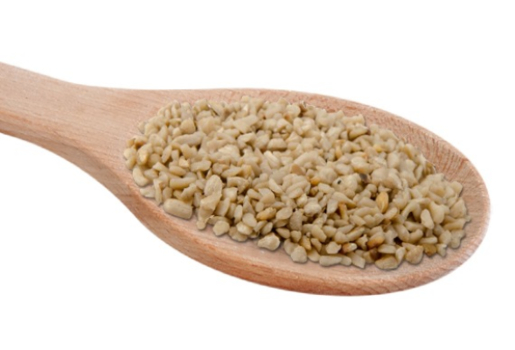
Shop Sunflower Heart Chips
Other popular feed options for spring include black sunflower seeds, mealworms, raisins and currants, and any feed mixes including these ingredients.
Feeding wild birds in summer
During the summer months nesting is in full swing, and families are in need of sustenance to keep their little ones fed. The best types of bird feed for summer feeding include all types of seeds, particularly black sunflower seeds and sunflower hearts. Mixed bird seed - which contains a lot of different ingredients are also very popular since the greater the variety of ingredients - the greater the variety of bird species you are likely to have visiting your feeders. Mixed seed such as our original farm mix - contains 13 different ingredients so there is something for all garden visitors to enjoy!
Mealworms are packed with protein and energy and can be offered to wild birds all year round, but are especially welcome in the Summer when adults are feeding youngsters. Live mealworms contain lots of water which is a good source of water for youngsters in the nest.
Suet balls can be problematic during the summer months - especially if it is very hot, they can be susceptible to melting.
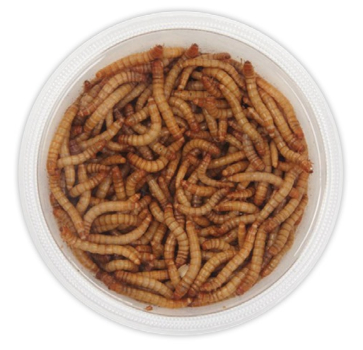
Shop Live Mealworms
Feeding wild birds in autumn
Autumn is one of the most bountiful seasons for wild birds with nuts, berries, and seeds ripening ahead of winter. In the autumn wild birds are preparing for the winter, and that means packing in as many extra calories as they can. Put out high-energy and high-fat foods to help them maintain their fat reserves. Birds will go through a moulting season where they naturally don't eat very much and when the hedgerows are plentiful, you may find there are very few birds in your garden. But don't despair! Once Mother nature's stores are depleted, garden birds will return to feeders as food become scarce.
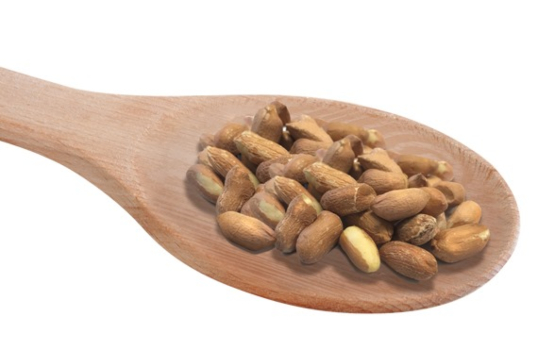
Shop Classic Peanuts
Feeding wild birds in winter
The winter is one of the harshest times of year for wild birds; during this period, it’s essential for wild birds to enjoy high-fat, high-calories, and nutrient-rich feed. The best types of bird feed to put out during winter includes suet products, but also high energy seed mixes high energy seed mixes and sunflower hearts
Read More: Tips for Feeding Birds in Winter
Avoid putting out basic feeds that aren’t packed with high quality nutrients; things that have a lot of fillers such as wheat, peas and other grains– this can fill wild birds quickly and leave them with little room for food that provides the nutrients they need.
Our fan-favourite for winter wild bird feeding are these mealworm fat balls; high in calories, high in essential oils, and high in nutrients. The mealworms give an extra source of protein, essential for the winter months, and also give a delicious taste loved by birds!
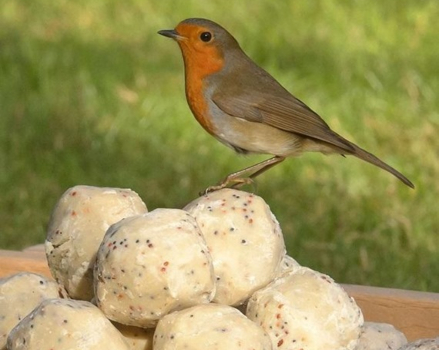
Shop Mealworm Suet Fat Balls
*
Remember, when bird feeding, no matter the season, it’s important to keep your feeders clean to avoid the build-up of harmful germs and bacteria. If you’d like to read more on feeder hygiene, check out our blog How to Clean & Disinfect Your Bird Feeders.
Here at Really Wild Bird Food we have a wide selection of various bird feeds and bird feeders suited to various gardens, seasons, and birds. If you’d like to browse our stock, take a look down below.
Bird Foods Bird Feeders
If you have any questions about bird feeding and would like some expert advice, reach out and contact us.. A member of our team will be more than happy to answer any questions you may have.
Contact Us
Read More: Remember to Put Out Water for Birds in Summer!
 Bird Feeders
Bird Feeders  Seed Feeders
Seed Feeders Peanut Feeders
Peanut Feeders Peanut Butter Feeders
Peanut Butter Feeders Suet & Fat Feeders
Suet & Fat Feeders Window Feeders
Window Feeders Hanging Feeders
Hanging Feeders Feeding Stations
Feeding Stations Ground Feeders
Ground Feeders Easy Clean Feeders
Easy Clean Feeders Bird Tables
Bird Tables Seed Trays
Seed Trays Bird Baths & Drinkers
Bird Baths & Drinkers Feeder Accessories
Feeder Accessories Feeder Hygiene
Feeder Hygiene Squirrel Proof Bird Feeders
Squirrel Proof Bird Feeders For the Kids
For the Kids Niger Seed Feeders
Niger Seed Feeders Mealworm Feeders
Mealworm Feeders Bird Food Storage
Bird Food Storage Fat Ball Feeders
Fat Ball Feeders Tube Feeders
Tube Feeders













